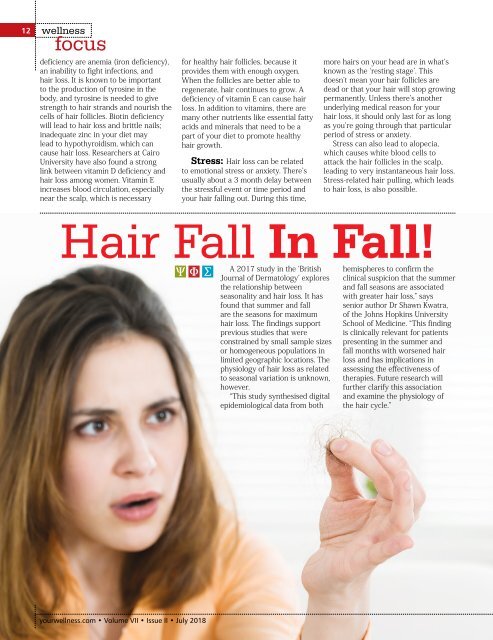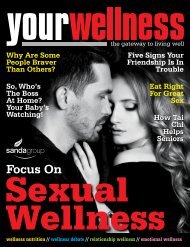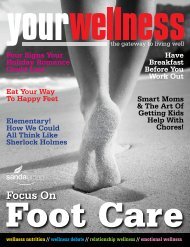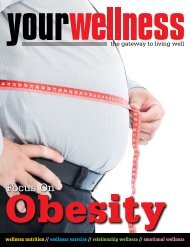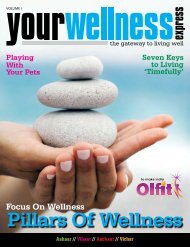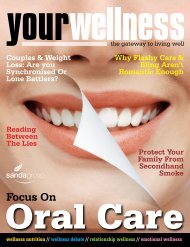New India_Assurance_ISSUE_July-2018
Create successful ePaper yourself
Turn your PDF publications into a flip-book with our unique Google optimized e-Paper software.
12 wellness<br />
focus<br />
deficiency are anemia (iron deficiency),<br />
an inability to fight infections, and<br />
hair loss. It is known to be important<br />
to the production of tyrosine in the<br />
body, and tyrosine is needed to give<br />
strength to hair strands and nourish the<br />
cells of hair follicles. Biotin deficiency<br />
will lead to hair loss and brittle nails;<br />
inadequate zinc in your diet may<br />
lead to hypothyroidism, which can<br />
cause hair loss. Researchers at Cairo<br />
University have also found a strong<br />
link between vitamin D deficiency and<br />
hair loss among women. Vitamin E<br />
increases blood circulation, especially<br />
near the scalp, which is necessary<br />
for healthy hair follicles, because it<br />
provides them with enough oxygen.<br />
When the follicles are better able to<br />
regenerate, hair continues to grow. A<br />
deficiency of vitamin E can cause hair<br />
loss. In addition to vitamins, there are<br />
many other nutrients like essential fatty<br />
acids and minerals that need to be a<br />
part of your diet to promote healthy<br />
hair growth.<br />
Stress: Hair loss can be related<br />
to emotional stress or anxiety. There’s<br />
usually about a 3 month delay between<br />
the stressful event or time period and<br />
your hair falling out. During this time,<br />
more hairs on your head are in what’s<br />
known as the ‘resting stage’. This<br />
doesn’t mean your hair follicles are<br />
dead or that your hair will stop growing<br />
permanently. Unless there’s another<br />
underlying medical reason for your<br />
hair loss, it should only last for as long<br />
as you’re going through that particular<br />
period of stress or anxiety.<br />
Stress can also lead to alopecia,<br />
which causes white blood cells to<br />
attack the hair follicles in the scalp,<br />
leading to very instantaneous hair loss.<br />
Stress-related hair pulling, which leads<br />
to hair loss, is also possible.<br />
Hair Fall In Fall!<br />
A 2017 study in the ‘British<br />
Journal of Dermatology’ explores<br />
the relationship between<br />
seasonality and hair loss. It has<br />
found that summer and fall<br />
are the seasons for maximum<br />
hair loss. The findings support<br />
previous studies that were<br />
constrained by small sample sizes<br />
or homogeneous populations in<br />
limited geographic locations. The<br />
physiology of hair loss as related<br />
to seasonal variation is unknown,<br />
however.<br />
“This study synthesised digital<br />
epidemiological data from both<br />
hemispheres to confirm the<br />
clinical suspicion that the summer<br />
and fall seasons are associated<br />
with greater hair loss,” says<br />
senior author Dr Shawn Kwatra,<br />
of the Johns Hopkins University<br />
School of Medicine. “This finding<br />
is clinically relevant for patients<br />
presenting in the summer and<br />
fall months with worsened hair<br />
loss and has implications in<br />
assessing the effectiveness of<br />
therapies. Future research will<br />
further clarify this association<br />
and examine the physiology of<br />
the hair cycle.”<br />
yourwellness.com • Volume VII • Issue II • <strong>July</strong> <strong>2018</strong>


